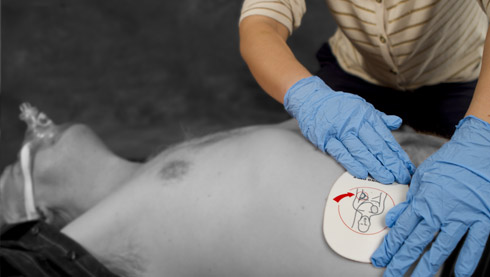Many men with sudden cardiac arrest had early warnings
Cardiac arrest symptoms: chest pain, shortness of breath, dizziness, faintness or heart palpitations.
Many sudden cardiac arrests leave a calling card in advance.
More than half of middle-aged men who experienced sudden cardiac arrests had symptoms up to a month beforehand, a new study shows.
Most of the symptoms - including chest pain, shortness of breath, dizziness, faintness or heart palpitations - occurred four weeks to one hour before their hearts suddenly stopped, according to the research presented Tuesday at the American Heart Association’s Scientific Sessions in Dallas.
Cardiac arrest occurs when the heart stops due to a failure in its electrical system, the heart association says. Patients can sometimes survive if they receive CPR immediately and a defibrillator is used quickly to shock the heart into a normal rhythm.
The term heart attack is often mistakenly used to describe cardiac arrest. While a heart attack may cause cardiac arrest and sudden death, the terms don’t mean the same thing, the heart association says. Heart attacks are caused by a blockage that stops blood flow to the heart.
About 360,000 out-of-hospital cardiac arrests are reported each year in the USA, the heart group says.
 Cardiac arrest “is the ultimate heart problem,” says the study’s senior author, Sumeet Chugh, a cardiologist and associate director for genomic cardiology at the Cedars-Sinai Heart Institute in Los Angeles. “It’s electrical chaos. You’ll die within 10 minutes of a cardiac arrest unless you are lucky enough to get emergency assistance quickly.”
Cardiac arrest “is the ultimate heart problem,” says the study’s senior author, Sumeet Chugh, a cardiologist and associate director for genomic cardiology at the Cedars-Sinai Heart Institute in Los Angeles. “It’s electrical chaos. You’ll die within 10 minutes of a cardiac arrest unless you are lucky enough to get emergency assistance quickly.”
“The national average is that 90% of people who have sudden cardiac arrest are going to die,” he says.
James Gandolfini, star of The Sopranos, and TV journalist Tim Russert died in their 50s of sudden cardiac arrests, Chugh says. “These are the deaths we are trying to prevent.”
Chugh and colleagues studied data on the symptoms and health histories of 567 men from Portland, Ore., who were ages 35 to 65 and had out-of-hospital cardiac arrests between 2002 and 2012. The medical histories were gathered from emergency medical records and health-care records. Chugh is the founder of the study that has been going on for 12 years. Among findings:
• 53% had symptoms prior to the cardiac arrest.
• Of those who had symptoms, 56% had chest pain; 13%, shortness of breath; 4%, dizziness, fainting or heart palpitations.
• Almost 80% of the symptoms occurred between four weeks and one hour before the sudden cardiac arrest.
• Most of the men had coronary artery disease, but only a quarter had been diagnosed.
“If you have symptoms, don’t blow them off,” Chugh says. “Go see your health care provider. Don’t waste time.”
 Cardiologist Gina Lundberg, assistant professor of medicine at Emory University School of Medicine in Atlanta, who wasn’t involved in this study, agrees. “People need to pay attention to symptoms that are new or unusual for them. Most people dismiss more subtle symptoms such as lightheadedness, dizziness, palpitations or mild chest discomfort as not being serious. Paying attention to these mild symptoms could save more lives.”
Cardiologist Gina Lundberg, assistant professor of medicine at Emory University School of Medicine in Atlanta, who wasn’t involved in this study, agrees. “People need to pay attention to symptoms that are new or unusual for them. Most people dismiss more subtle symptoms such as lightheadedness, dizziness, palpitations or mild chest discomfort as not being serious. Paying attention to these mild symptoms could save more lives.”
Chugh says the researchers also are studying cardiac arrests in women.
###
Nanci Hellmich, USA TODAY